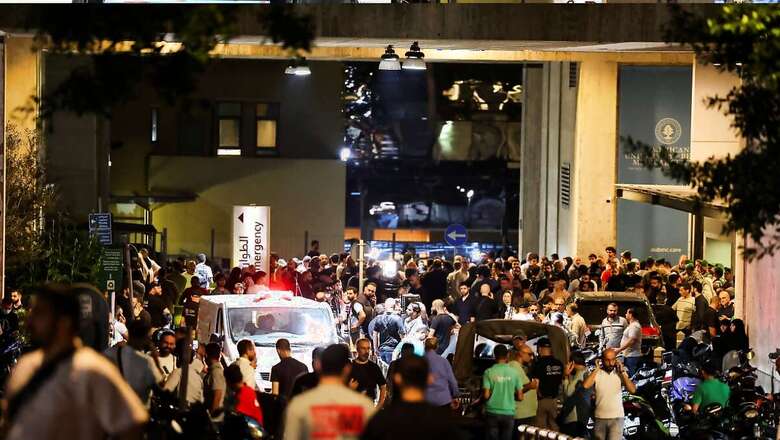
views
Israel’s Mossad spy agency hid three grams of explosives inside 5,000 Taiwan-made pagers ordered by the Lebanese group Hezbollah months before Tuesday’s detonations, according to American and other officials briefed on the operation.
The pagers, ordered by Hezbollah from Gold Apollo in Taiwan, were tampered with before arriving in Lebanon, The New York Times reported, citing officials. Most were the AP924 model, though the shipment also included three other Gold Apollo models, the report added.
However, Taiwanese company Gold Apollo on Wednesday denied a report that it had produced hundreds of explosive-packed pagers used by Hezbollah members. “They are not our products from beginning to end. How can we produce products that are not ours?” company head Hsu Chin-kuang told reporters in Taipei after the NYT reported that his company’s pagers were involved in the blasts.
‘Three grams of explosive’
Hezbollah has accused Israel of orchestrating the attack but has provided limited details about its understanding of the operation. Israel has not commented on the attack or confirmed its involvement. According to NYT, Israel intercepted the pagers from Taiwan that detonated in the pockets of thousands of Hezbollah fighters before they reached Lebanon. Israel tampered with the devices that Hezbollah ordered and placed three grams of explosive material next to the battery in each pager.
The United States said Tuesday it was not aware in advance and had no involvement in mass explosions of pagers used by Lebanon’s Hezbollah, as it urged restraint by Iran in response. “I can tell you that the US was not involved in it, the US was not aware of this incident in advance and, at this point, we’re gathering information,” State Department spokesman Matthew Miller told reporters.
Miller declined to comment on widespread suspicion that the blasts were carried out by Israel, which has been regularly trading fire with Hezbollah after the October 7 attack on Israel by another Iranian ally, Hamas. The blasts came after weeks of private diplomacy by the United States to discourage a major Iranian retaliation against Israel for the killing of the Hamas political chief, Ismail Haniyeh, on a visit to Tehran. Miller said the US message to Iran remained unchanged.
“We would urge Iran not to take advantage of any incident to try to add further instability and to further increase tensions in the region,” Miller said. A senior US envoy, Amos Hochstein, a day earlier met with Prime Minister Benjamin Netanyahu and other Israeli officials as he sought to discourage a full-scale war against Lebanon.
“We do want to see a diplomatic resolution to the conflict between Israel and Hezbollah,” Miller said. “We want to see one that allows the tens of thousands of Israelis who’ve been displaced from their homes and the tens of thousands of Lebanese who have been displaced from their homes to be able to return home,” Miller said. But Miller suggested that Hezbollah was fair game to strike, without confirming Israeli involvement. “Terrorist members of a terrorist organization are legitimate targets for countries to launch operations against,” Miller said.
(With agency inputs)
















Comments
0 comment